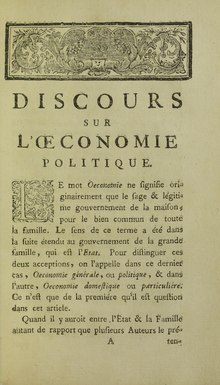
Back Politieke ekonomie Afrikaans اقتصاد سياسي Arabic Economía política AST Siyasi iqtisadiyyat Azerbaijani Политическа икономия Bulgarian রাজনৈতিক অর্থনীতি Bengali/Bangla Economia política Catalan ئابووری سیاسی CKB Politická ekonomie Czech Economeg wleidyddol Welsh
| Part of a series on |
| Economics |
|---|
 |
| Part of the Politics series |
| Politics |
|---|
|
|

Political economy is a branch of political science and economics studying economic systems (e.g. markets and national economies) and their governance by political systems (e.g. law, institutions, and government).[1][2][3][4] Widely studied phenomena within the discipline are systems such as labour markets and financial markets, as well as phenomena such as growth, distribution, inequality, and trade, and how these are shaped by institutions, laws, and government policy. Originating in the 18th century, it is the precursor to the modern discipline of economics.[5][6] Political economy in its modern form is considered an interdisciplinary field, drawing on theory from both political science and modern economics.[4]
Political economy originated within 16th century western moral philosophy, with theoretical works exploring the administration of states' wealth; political signifying the Greek word polity and economy signifying the Greek word οἰκονομία; household management. The earliest works of political economy are usually attributed to the British scholars Adam Smith, Thomas Malthus, and David Ricardo, although they were preceded by the work of the French physiocrats, such as François Quesnay and Anne-Robert-Jacques Turgot.[7]
In the late 19th century, the term economics gradually began to replace the term political economy with the rise of mathematical modeling coinciding with the publication of the influential textbook Principles of Economics by Alfred Marshall in 1890. Earlier, William Stanley Jevons, a proponent of mathematical methods applied to the subject, advocated economics for brevity and with the hope of the term becoming "the recognised name of a science".[8][9] Citation measurement metrics from Google Ngram Viewer indicate that use of the term economics began to overshadow political economy around roughly 1910, becoming the preferred term for the discipline by 1920.[10] Today, the term economics usually refers to the narrow study of the economy absent other political and social considerations while the term political economy represents a distinct and competing approach.
- ^ Hacker, Jacob S.; Hertel-Fernandez, Alexander; Pierson, Paul; Thelen, Kathleen (2021), Hertel-Fernandez, Alexander; Hacker, Jacob S.; Thelen, Kathleen; Pierson, Paul (eds.), "The American Political Economy: A Framework and Agenda for Research", The American Political Economy: Politics, Markets, and Power, Cambridge University Press, pp. 4–5, ISBN 978-1-316-51636-2, archived from the original on 2022-05-03, retrieved 2022-06-18
- ^ Bladen, Vincent (2016). An Introduction to Political Economy. University of Toronto Press. ISBN 978-1442632103. OCLC 1013947543.
- ^ Mill, John Stuart, 1806–1873. (2009). Principles of political economy : with some of their applications to social philosophy. Bibliolife. ISBN 978-1116761184. OCLC 663099414.
{{cite book}}: CS1 maint: multiple names: authors list (link) CS1 maint: numeric names: authors list (link) - ^ a b "political economy | Britannica". www.britannica.com. Archived from the original on 2019-12-14. Retrieved 2022-05-15.
- ^ "economics | Definition, History, Examples, Types, & Facts | Britannica". www.britannica.com. Archived from the original on 2015-06-15. Retrieved 2022-05-15.
- ^ Weingast, Barry R.; Wittman, Donald A. (2011-07-07). "Overview Of Political Economy". The Oxford Handbook of Political Science. doi:10.1093/oxfordhb/9780199604456.013.0038. Archived from the original on 2022-05-15. Retrieved 2022-05-15.
- ^ Steiner (2003), pp. 61–62
- ^ Jevons, W. Stanley. The Theory of Political Economy, 1879, 2nd ed. p. xiv. Archived 2023-04-12 at the Wayback Machine
- ^ Groenwegen, Peter. (1987 [2008]). "'political economy' and 'economics'", The New Palgrave: A Dictionary of Economics, v. 3, pp. 905–906. [Pp. 904–07.]
- ^ Mark Robbins (2016) "Why we need political economy," Policy Options, [1] Archived 2019-04-02 at the Wayback Machine